Key takeaways:
- Logistics, ambiance, and clear communication with venue staff are critical to the success of an event.
- Respecting capacity limits and confirming technical requirements prevents overcrowding and equipment issues.
- Conducting thorough research and a venue walkthrough before the event helps identify potential hidden problems.
- Flexibility and a clear timeline are essential for managing unexpected changes smoothly during the event.
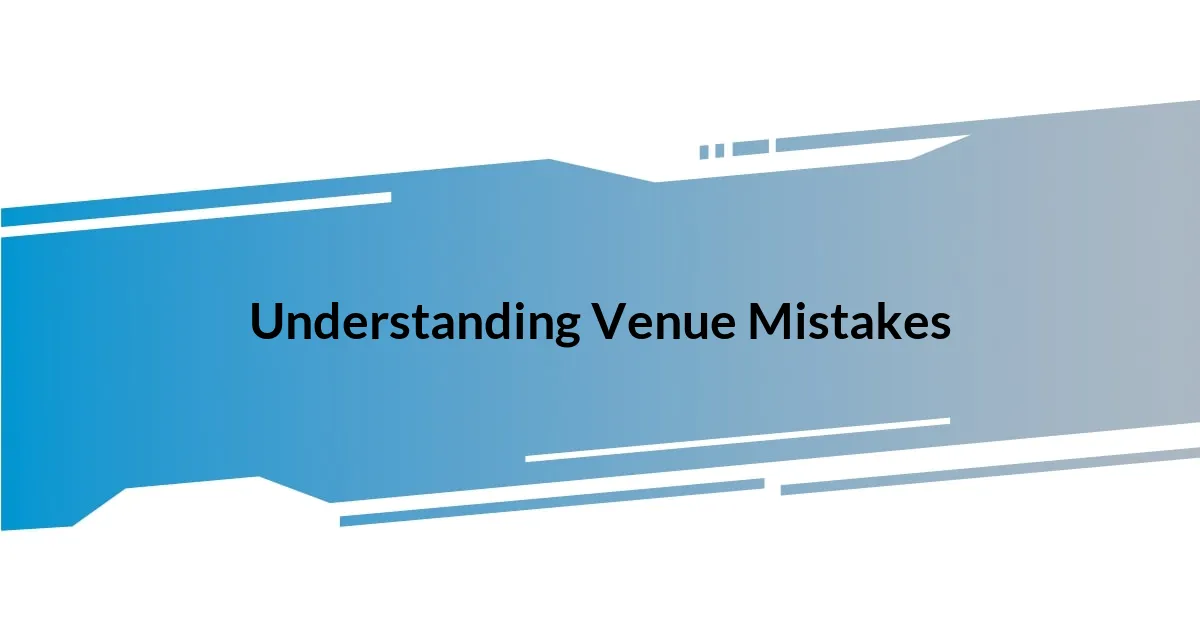
Understanding Venue Mistakes
Understanding venue mistakes often comes down to a few common missteps that can make or break an event. I remember once booking a venue that looked great on paper but turned out to be located in an inaccessible spot. How many times have we overlooked the logistics, thinking attendees would find their way without a hitch?
There’s also the challenge of underestimating the impact of ambiance. I learned the hard way that a venue’s layout can significantly affect guest interaction. At one of my events, the flow didn’t work, leading to awkward clusters of people in one corner while the food and drinks sat untouched in another. It’s moments like these that make you wonder: how much does atmosphere truly matter in creating memorable experiences?
Finally, let’s not forget about communication with the venue staff. I had a situation where the catering staff and the event coordinator were not on the same page, leading to confusion during a critical moment. Have you ever witnessed chaos unfold because the right hand doesn’t know what the left hand is doing? These experiences serve as important reminders that the success of an event hinges not just on the venue itself, but on every interaction that occurs within it.
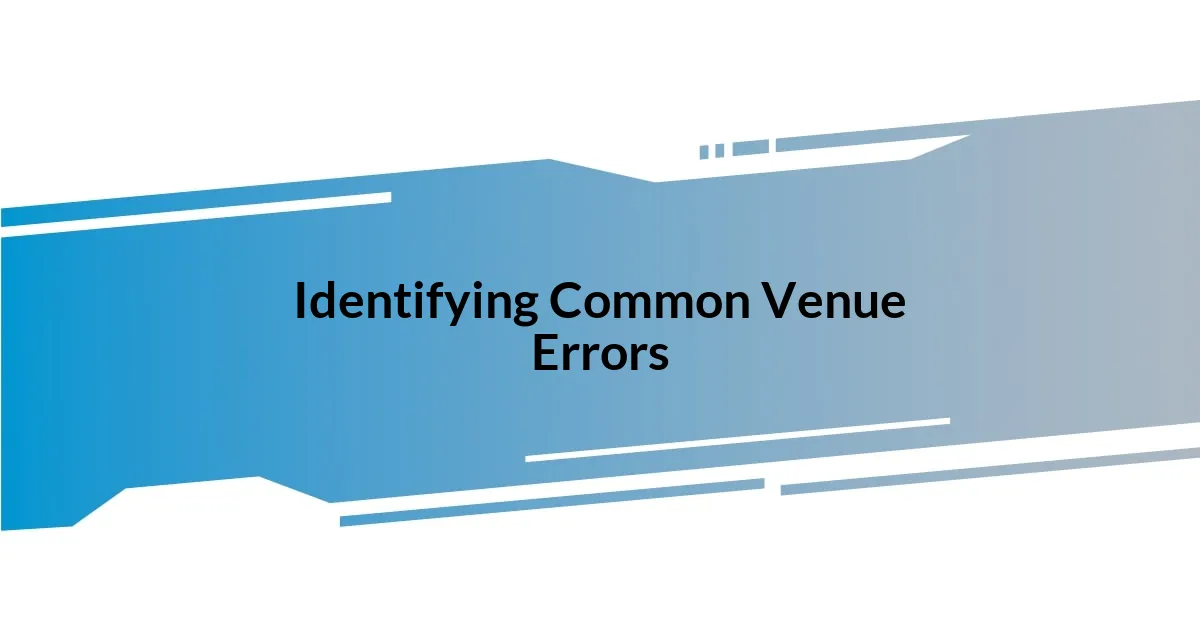
Identifying Common Venue Errors
Identifying common venue errors starts with acknowledging the critical oversight of capacity limits. I once planned an event believing we could cram an extra twenty people into a space that was already bustling. The moment guests started arriving, I felt the panic settle in—there simply wasn’t enough room for everyone! This mistake taught me that respecting capacity is not only about comfort but also about safety.
Another frequent misjudgment is neglecting the importance of technical equipment requirements. I encountered a scenario where the audio-visual setup fell short because I assumed the venue would provide everything necessary. Instead, I found myself running around last minute, desperately seeking a compatible projector. Reflecting on this, I learned that assumptions can lead to unnecessary stress and chaos, and it’s best to clarify what equipment will be available—or to bring your own to avoid potential pitfalls.
Lastly, the issue of not considering parking or transportation options often sneaks up on planners. During one particular event, I was stunned to see guests wandering around confused, trying to find a spot to park. I felt guilt wash over me as many ended up late or even missed key moments simply due to poor planning. It reminded me that a great venue isn’t just about the space but encompasses the entire experience, including ease of access.
| Error Type | Example |
|---|---|
| Capacity Limits | Overcrowded venue leading to discomfort |
| Technical Equipment | Missing essential audio-visual gear |
| Parking Issues | Guests struggling to find parking |
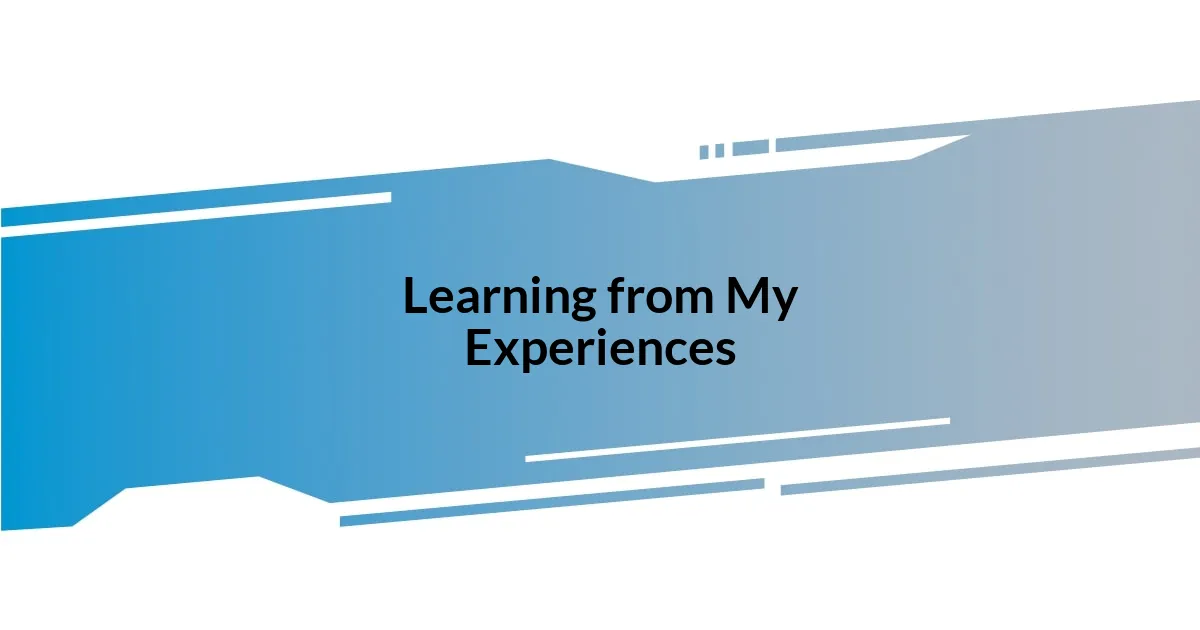
Learning from My Experiences
Learning from my experiences has been a rewarding yet sometimes painful journey. I remember a time when I underestimated the importance of setting clear timelines with the venue. Arriving the day of an event, I discovered that my setup time was cut in half because the earlier event ran late. The anxiety I felt in those moments taught me that communication isn’t just about talking; it’s about ensuring everyone is on the same page and respecting each other’s schedules.
- Effective communication is vital; set strict timelines with the venue.
- Always confirm the details days before the event to avoid surprises.
- Don’t be afraid to ask for adjustments if issues arise on the day.
Reflecting on my years of venue planning, I’ve also learned that flexibility is key. There was this incident where a vendor didn’t show up, leaving me scrambling to find a replacement. It was stressful, to say the least, but it also taught me the value of having backup plans. Now, I always take the extra step to have alternatives ready, just in case things don’t go as planned. I can’t stress enough how this mindset shift has turned potential disasters into manageable hiccups.
- Always have backup options for vendors.
- Create a ‘Plan B’ for every essential aspect of your event.
- Practice remaining calm in the face of unexpected changes; it makes all the difference.
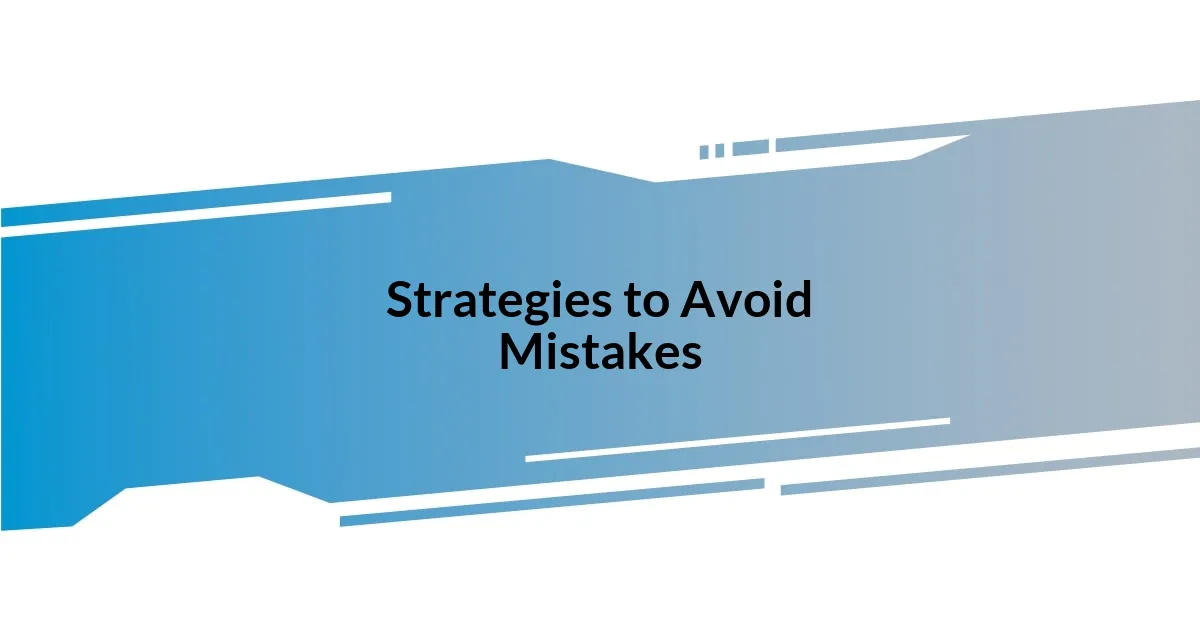
Strategies to Avoid Mistakes
To steer clear of venue mistakes, it’s imperative to prioritize thorough research on every potential location. I recall visiting a beautiful venue that seemed perfect at first glance, but after digging deeper, I discovered hidden fees and restrictions that would have derailed my entire budget. Imagine the relief I felt when I learned about those costs upfront rather than being hit with surprises later! This experience taught me to always read the fine print and ask detailed questions before making a decision.
Having a well-structured checklist can be a game-changer. It’s not just about packing your event essentials; I’ve learned to include every detail, from seating arrangements to technical setups. On one occasion, I forgot to confirm a critical catering service, and with only a few hours left, I scrambled to find an alternative. If I had relied on a comprehensive checklist, I could have replaced that stress with confidence and efficiency. Do you have a reliable system in place? If not, now might be the time to create one.
Lastly, never underestimate the power of a venue walkthrough. I always insist on visiting the space before the event, taking note of what works and what doesn’t. Once, a site visit revealed a major accessibility issue that could have affected many guests—wheelchair access was not clearly marked, which I had initially overlooked. This realization struck hard, as inclusivity is vital. By personally assessing the environment, you can catch potential errors early and advocate for necessary adjustments that ensure a seamless experience for everyone involved.
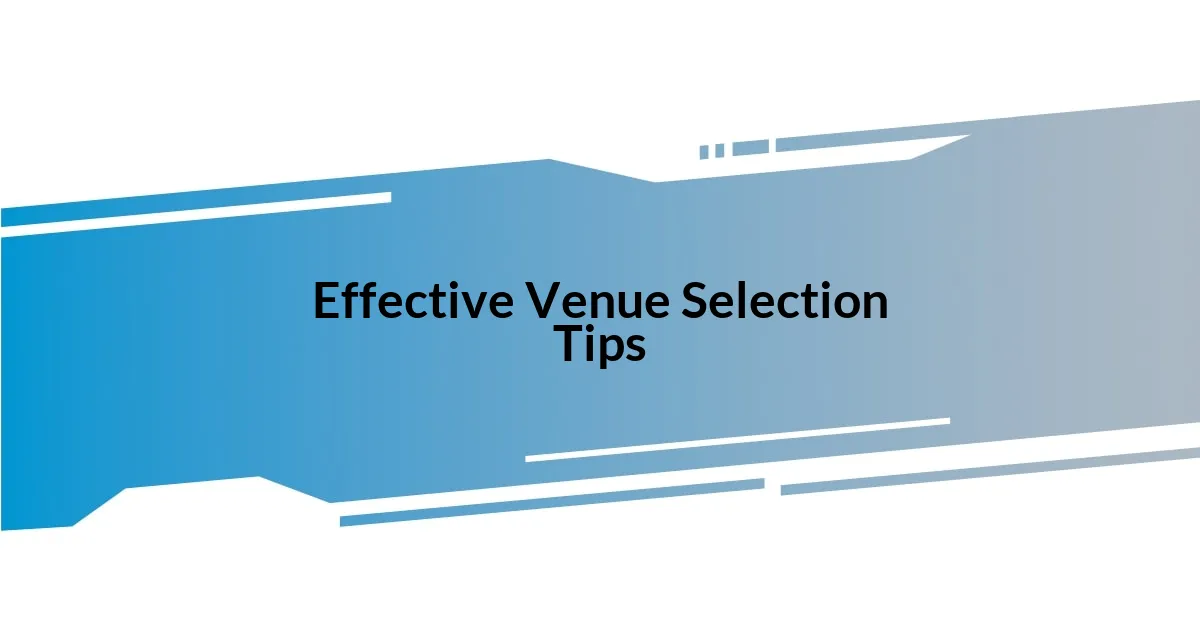
Effective Venue Selection Tips
Selecting the right venue isn’t just about aesthetics; it’s about how well it fits your vision. I remember walking into one stunning location and almost signing the agreement then and there. However, once I started visualizing the guest flow and logistics, I realized the layout would choke off movement and create a chaotic vibe. I learned that figuring out how guests will interact within the space is crucial. Have you ever felt trapped in a crowded room? A well-thought-out venue shouldn’t do that to your event.
Another key tip is to trust your instincts. I recall a time when I opted for a venue that everyone was raving about. Sure, it looked fantastic in photos, but the reality was a loud, echoing hall that left guests shouting to converse. It was a humbling reminder that sometimes, what’s popular doesn’t always equate to what’s suitable for your specific event. Trust your gut feeling—if something feels off, don’t hesitate to explore other options. After all, you want your event to create lasting memories, not just good Instagram shots.
Finally, don’t shy away from negotiating terms. I once faced a situation where the venue had a strict no-extension rule for the end time, which scared me. But in a candid conversation with the manager, I proposed a later exit time in exchange for an increased deposit. To my surprise, they agreed! This experience was an empowering one, showing me that being upfront about your needs can lead to unexpected flexibility. So, what’s stopping you from advocating for your event’s success? You’re in charge, and discussing your needs is perfectly reasonable.
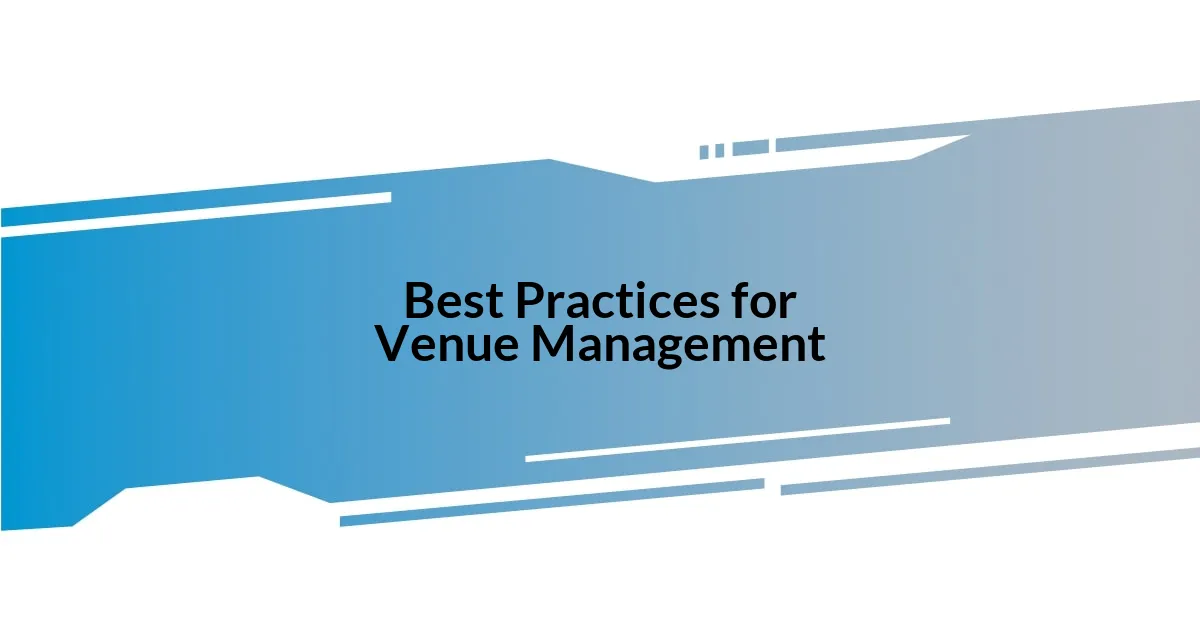
Best Practices for Venue Management
When managing a venue, communication is key. I remember a time when I didn’t clarify our requirements with the staff, leading to a communication breakdown. The audiovisual setup on the event day was subpar, causing unnecessary stress. Now, I always ensure to establish a direct line of communication. Have you ever experienced the chaos that comes from miscommunication? It can be overwhelming, but a simple pre-event meeting can drastically improve coordination and set the stage for success.
Another best practice I’ve adopted is creating a detailed timeline for the event day. I used to wing it, thinking I could handle things as they unfolded. However, during one particularly challenging event, I found myself overwhelmed and playing catch-up, trying to address multiple issues simultaneously. By mapping out a timeline with specific tasks and responsibilities, I was able to maintain control and adapt to unexpected changes. Doesn’t it feel good to have a clear plan? Having a written schedule can help you anticipate problems and keep everything running smoothly.
Lastly, embracing feedback is essential for continual improvement. After each event, I gather input from both my team and attendees. I recall one event that received mixed reviews regarding catering choices. Instead of brushing it off, I engaged with the feedback and adjusted my approach for future events. This not only improved guest satisfaction but also built trust within my team. So, how often do you ask for feedback? Making it a regular practice can open doors to insights that elevate your venue management game.
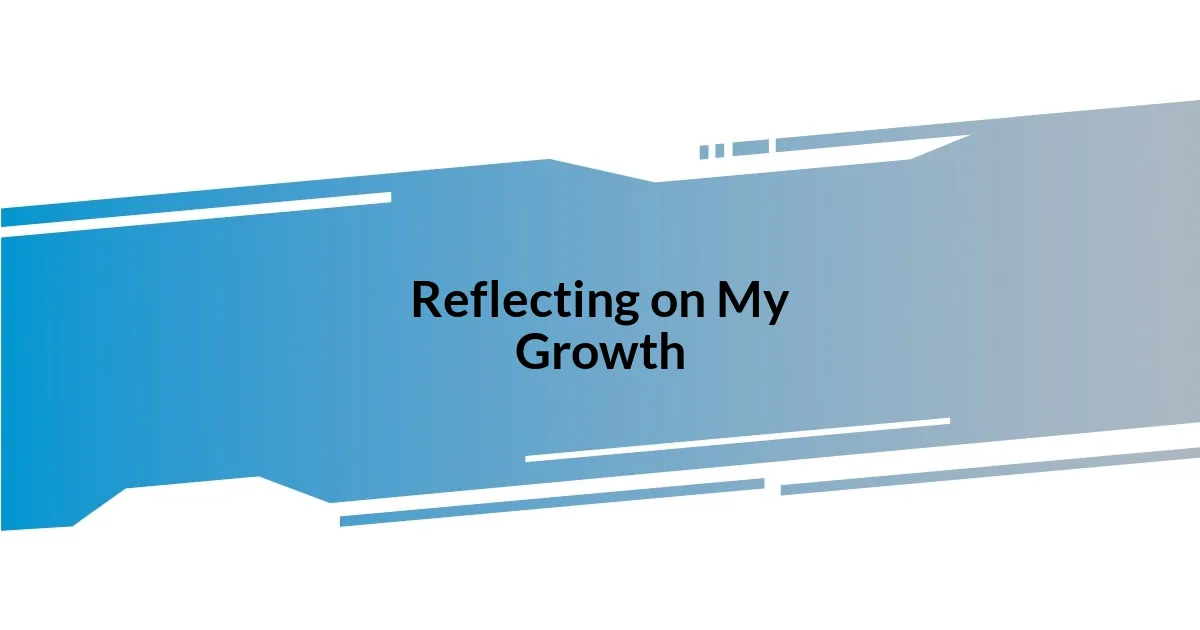
Reflecting on My Growth
Reflecting on my journey, I’ve realized how every mistake serves as a stepping stone toward growth. I can still picture the day I underestimated the importance of a solid contract. It seemed like just another formality, yet when an unexpected issue arose, I found myself scrambling for clarity. That experience taught me that the fine print holds significant power. How often do we overlook details in our haste?
There was a time I let my emotions blind my judgment. I was so enthusiastic about curating a unique event that I ignored red flags regarding the venue’s reputation. After facing last-minute changes that threw everything into disarray, I learned the value of thorough research. It’s amazing how a little diligence can save you from a whirlwind of stress. Have you ever let excitement overshadow your common sense?
Looking back, I find that openness to learning has been the most transformative aspect of my growth. In a recent event, we faced a last-minute decor mishap. Instead of panicking, I gathered my team, and we brainstormed solutions together. That collaboration turned a potential disaster into an opportunity for creativity. Seeing everyone’s faces light up with ideas made me realize—it’s not just about the event; it’s about the people and their contributions. Isn’t it empowering to turn challenges into shared victories?